In the wide range of Afro-French speaking circles surfing on the Hamitic ideology which led to the genocide against the Tutsi in 1994 in Rwanda, a colorful figure occupies a central place and attracts an ever-widening audience eager for simple and radical content that would explain Congo’s endless setbacks. His name is Denis Mukwege.
His aura, carefully-crafted over time, makes it difficult to criticize him today. For the Congolese, the rest of the African continent, as well as from the Western point of view, he is the African Nobel Peace Prize of our time, a fierce defender of women victims of rape whom he “repairs”. The power of this term “repair” and the vocation to “fix” a broken woman, even tens of thousands of women, according to the figures he claims, give him the stature of a demigod. Trying to nuance the doctor’s action is unthinkable, especially within the circles that forged him: humanitarians and left-wing politicians, especially in France and in Anglo-Saxon countries. However, his reputation, like that of many public figures who have been praised without nuance, is marred by serious errors, strategies aimed at self-glorification and attachment to the most harmful ideologies.
Among some of his highly questionable choices as a Nobel Peace Prize awardee is his closeness to the polemicist Kemi Seba and his organization “Urgences Panafricanistes” [Pan-Africanist Emergencies]. There seems to be a logic to this choice. Both men have supporters and followers throughout the French-speaking world, in the hundreds of thousands. Their struggles regularly put them in the spotlight and for good reasons, the accuracy of their essence is undeniable – to fight against the CFA Franc, the slayer of African economies and an impediment to the self-determination of formerly colonized countries, and to fight for reparation, protection, and emancipation of Congolese women. From the Nobel Prize-winning doctor to the radical and uncompromising anti-white supremacy activist, the strategies differ while they support each other. Their resources and networks are complementary.
In terms of style, the two men are proud and self-assured, with an often-narcissistic tone that, far from being repulsive to their audience, assures them very strong feelings of attachment on the part of their admirers. Women want to be by their side, and as for men, they want to be like them.
Kemi Seba, Anti-Semitism, and Glorification of Black Supremacy
Kemi Seba, born Stellio Gilles Robert Capo Chichi, defines himself as an activist of Pan-Africanism. Born and raised in France, he founded the Kemite party in 2002 and the Ka Tribe in 2004. The latter was dissolved two years later for incitement to violence and anti-Semitism. After a few other attempts to create pseudo-radical organizations, but above all to call for the division and confrontation of racial groups that he considers pure and intrinsically enemies, he created the NGO Urgences Panafricanistes in 2016. The organization Conspiracy Watch notes that “at the beginning of 2006, in the midst of the Ilan Halimi affair, Kemi Seba sent an e-mail to several Jewish organizations in which, reports Le Figaro, he threatened them in these terms: “Whether our brother [Youssouf Fofana] is guilty or not, we warn you that if by chance, you wanted to lay a finger on him, instead of giving him a fair trial, we will take care of your rabbis’ foil packets.’”. Since then, Kemi Seba has hidden his appetite for anti-Semitic, racialist and conspiracy theories behind a mask of radicalism and a posture of constant insubordination.
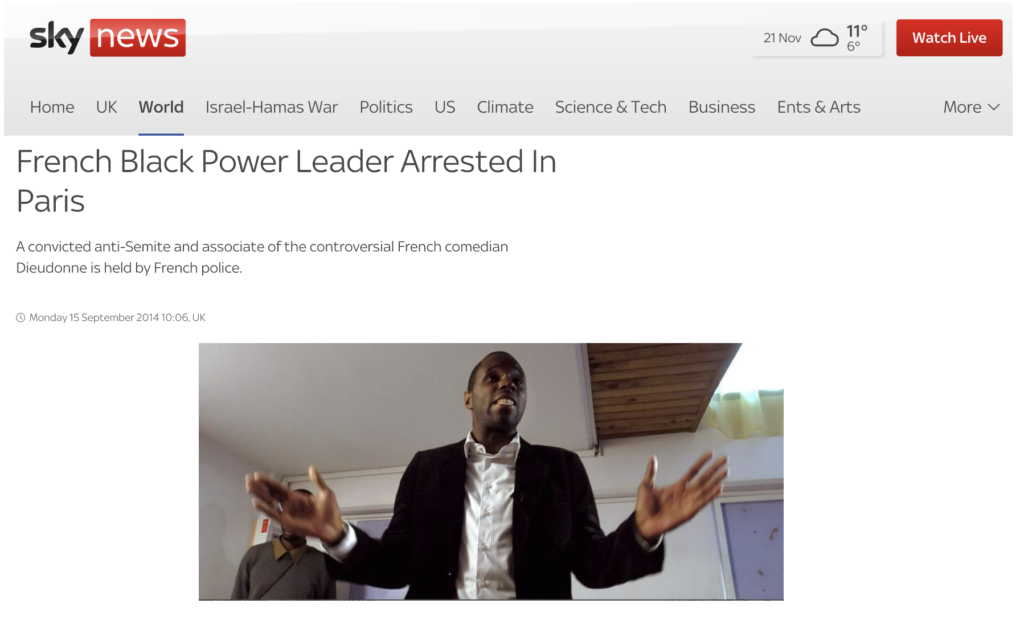
In France, these strategies as well as his proximity to the multi-convicted Dieudonné M’Bala M’Bala (embezzlement, anti-Semitism, denial of crimes against humanity) definitively classify him among the persona non grata in most organizational and influential circles, including those most radically anti-racist. However, he increasingly maintains and expands a large audience on his social media network by directly addressing the Afro-Francophone youth – wherever they are in the world – and tackling topics that are dear to them, such as the end of the economic domination by France in French-speaking African countries, the fight against the French stranglehold on the African presidential elections, the end of corruption encouraged by France and the construction of support networks for the most disadvantaged young people, who are excluded at all levels. It should be noted that Kemi Seba has received more than $400,000 in funding from the Russian Yevgeny Prigozhin and his mercenary group Wagner, itself involved in another form of domination and predation on the African continent, fact which Seba carefully avoids denouncing.
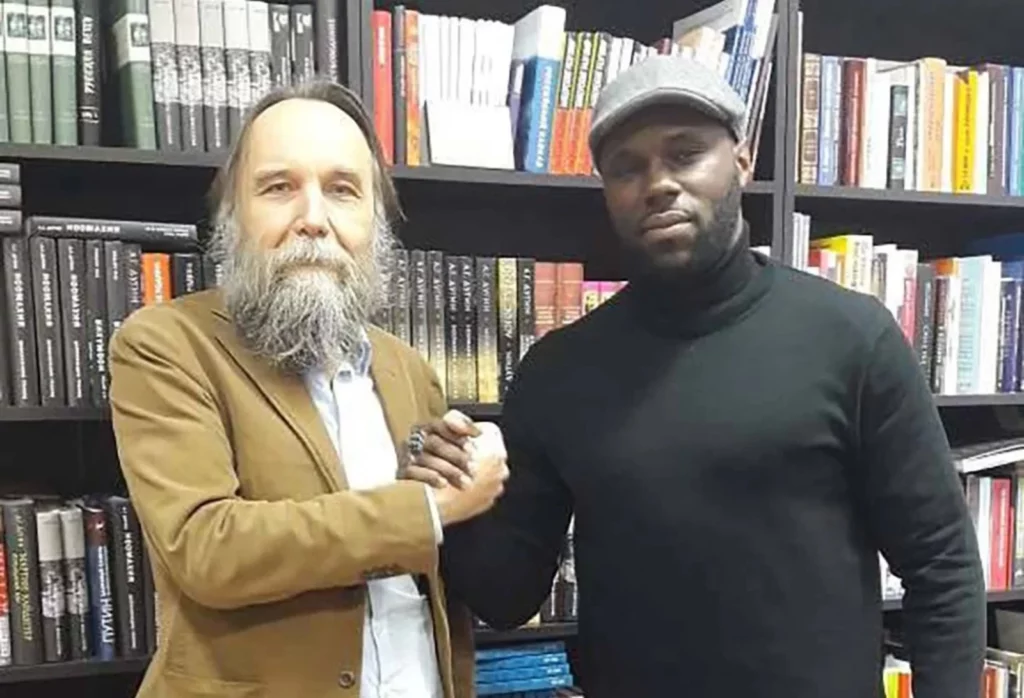
In his latest book, Philosophy of Fundamental Pan-Africanness (2023), he writes: “Eminent black personalities stipulate in their work that thanks to their high melanin levels, the auditory field of melanoderm children (black children) was more developed. (…) People with a high level of eumelanin (pigment of black skin) have a relationship with gravity, the balance is more advanced. Muscle mass, elasticity of the body and skin are more accentuated. We were designed this way because we are the fruit of the beginning.” Kemi Seba therefore believes in the physical superiority of the “black race”. He adopts a glorifying version of scientific racism. In the same book, he writes that “aware of their pathological fragility, the Caucasian (white) slavers, who could not have lasted more than ten minutes in the sugar cane fields without falling into a coma, used the power of the blacks and their capacity for resistance in the face of the hot climate (melanin being a coat that protected our people from a number of diseases related to ultraviolet rays).” In addition to it being a racialist and conspiratorial statement, he reinforces the negrophobic idea that black people fear less pain and physical discomfort than Caucasians. It is clear that these types of racial essentialisms which he promotes about black people are no less racist than the white supremacy he claims to be fighting against.
Kemi Seba, Anti-Tutsi Conspiracy Theories and Hutu Power
Regarding the Hamitic hate ideology which has kept the African Great Lakes region in a situation of chaos and instability for decades feeding Hutu Power conspiracy theories, Kemi Seba has for years positioned himself as a loud but knowingly ignorant commentator. He claims, as does the notorious genocide denier and far-right essayist Charles Onana, that Rwanda’s ultimate goal is to destabilize, plunder, and annex the Congo, as demonstrated in an extensive use of hateful rhetoric in a statement he made on Vox Africa in May 2021.
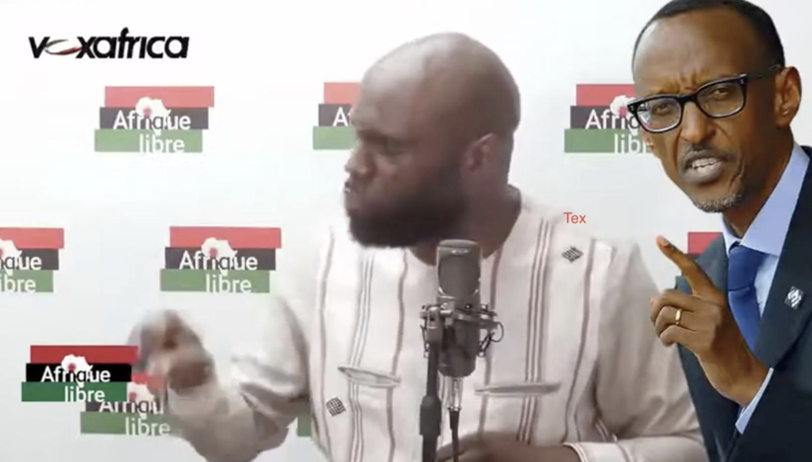
Here he reinforces the idea of an imagined struggle between two great figures of the Great Lakes: Dr. Mukwege with his immaculate image, and the one he sees as the personification of the invading Tutsi strategist, the Rwandan President Paul Kagame. This is a modern version of the ideas propagated by Hutu Powermembers, who committed the 1994 genocide against the Tutsi in Rwanda.
Kemi Seba leads hundreds of thousands of his followers, members or sympathizers of Pan-Africanist Emergencies throughout the French-speaking world, using anti-Tutsi rhetoric. Today, this Hamitic ideology he promotes is masked in a so-called anti-Rwanda discourse, operating with exactly the same ideological springs but fixated on the presidency of Rwanda (Paul Kagame being identified as a Tutsi). Anytime he is incited to speak or on his social media platforms he repeats the same old racialist conspiracy theories that have led to the genocide against the Tutsi in Rwanda.
Maud-Salomé Ekila: The hate communicator between Mukwege and Seba
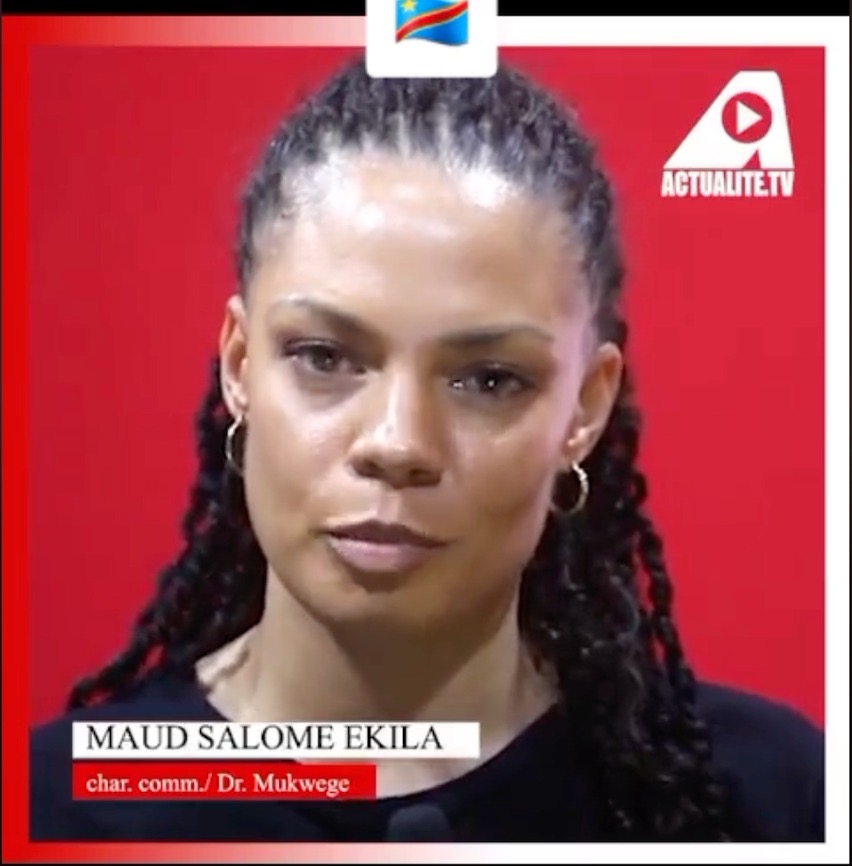
Known for her conspiracy theories against Rwanda and Tutsi, Maud-Salomé Ekila presents herself as representative of Kemi Seba’s organization and the Cabinet Officer of Mukwege’s NGO. On her social platforms, she makes frequent references to Charles Onana.

Ekila is a member of the communications team created on an ad hoc basis for the annual “Genocost” campaign. Their aim is to anchor in the collective consciousness an alleged “second genocide in Congo”, which would be motivated by money and engineered by Rwanda and Uganda, funded by Anglo-Saxons and Israel. Here again, it is the central theme of the work of Onana and his mentor Pierre Péan romanticized and calibrated for a wider audience. The international community is accused of allowing this to happen or colluding with Rwanda for the sole alleged purpose of broad access to mineral resources.
Indeed, in a promotional video of the “Genocost” campaign posted on September 6, 2023, also available on Charles Onana’s Instagram account, we can hear Ekila use the common “double-genocide” conspiracy theories. The crime of genocide refers to a precise historical-legal qualification, and its conditions are not met in the Congo. The “double-genocide” theory has been disproved, including by the United Nations which only recognizes one genocide in the Great Lakes, the 1994 genocide against the Tutsi in Rwanda. The “double-genocide” theory has similarly been invalidated for three decades by distinguished historians who have written extensively on the genocide against the Tutsi and the Great Lakes region.
Mukwege, Nobel and controversy
Denis Mukwege, a gynecologist and 2018 Nobel Peace Prize winner, was trained in France and Belgium, and works at the Panzi hospital which he founded in Bukavu, in eastern DRC. The non-profit Panzi Foundation, with the support of partner contributions, was created in 2016 with the aim of supporting patients on a legal, psycho-social and socio-economic level. One of its aims is to raise awareness about sexual violence against women.
As a multi-award-winning doctor and a Nobel Peace Prize winner, Mukwege has become a world celebrity. His speeches, in which he describes the ordeal of raped and mutilated women, have left a mark on his audience. The style and formulas he and those who promote him are calibrated to shock. For instance, Congo is the “rape capital of the world”, and rape is used to control territory and annihilate its population. Denis Mukwege is not merely satisfied that observers are empathetic towards women victims. His goal is deeper, to protect his country from a much older and more threatening “evil”. His audience is not simply informed, it is called upon to act and take a stand.
Like any massively supported media figure, pure anonimity is not on his agenda. Nonetheless, there is a controversy surrounding Mukwege. In the July 2015 issue of Revue XXI, Marion Quillard published “Those who have been raped raise your hand“, revealing important facts about Mukwege. In this in-depth investigation, we learn from a woman called Mathilde Muhindo that the situation in Kivu, where the Panzi clinic is located, exploded with the arrival of the Hutu fighters who perpetrated the genocide against Tutsi in Rwanda. Using the terms “rape tourism”, she elaborates on the lucrative presence of local NGOs that have existed in the east of DRC since the beginning of the violence, and of celebrities who parade on the soil of the Kivus, around the notorious doctor and his work at Panzi. Quillard then examines Panzi’s figures between 2004 and 2013, in a context where the most widespread figure in the official and social media is 500,000 women raped in Congo. She finds out that Panzi had received 32,247 women in the sexual violence program, despite the fact that 13,071 had come for delivery complications, and not for rape. This is added to the fact that Mukwege had said in an interview that he had “repaired” more than 40,000 women who had been raped over the same period.
Later, a lawyer working with the Panzi Foundation admitted that the majority of its cases are rapes committed by civilians, and a minority by armed groups and the national army. Françoise Bouchet Saulnier testifies to MSF over the same period that surgical reconstructions following rape are very rare in Congo, less than 10% according to her records. What emerges from this survey is that the figures of women raped are magnified and modified in their substance because the subject provides attention to humanitarian and health actors, and therefore large financial windfalls. As you read the survey, it becomes clear that women victims are still very poorly cared for and that the subject has been transformed into a political weapon and financial leverage around the notoriety of Denis Mukwege.
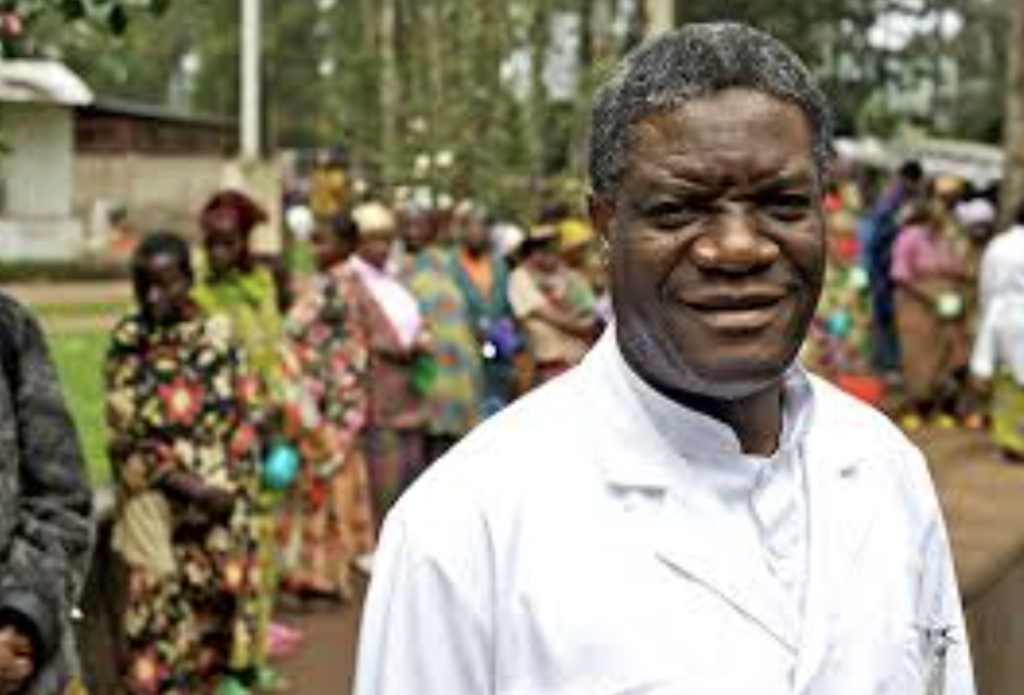
In a 2018 book L’autre face cachée by Mukwege’s former collaborator Anne Chirume Munange, two women, close to the Nobel Prize winner’s paternal family, testify. Their testimonies corroborate the facts denounced in Marion Quillard’s investigation. In the book, Chirume writes about the patients who were victims of rape at Panzi: “An old woman comes to Panzi Hospital for treatment. The officer in charge of her case gently pulls her and says ‘The hospital offers you x benefits on condition that you agree to be on the list of victims of sexual violence.’ ‘Me! At my age! What a horror! What a curse! Under no circumstances can I accept such an offer, which is likely to bring upon me all the misfortunes of the world! I’m sorry! I am not prepared to disgrace my own family, no matter what the cost…” and, “An association whose name we do not mention, operates next to the Panzi hospital. It strives to distribute small loans to vulnerable women. Its beneficiaries try the best they can to repay the small funds they obtained. Curiously, these women are coveted by the hospital. They are picked, manipulated and find themselves on the list of victims of sexual violence and finally interned in the Panzi hospital… “.
Chirume also writes that “[in] 2010 “two girls from Kinshasa arrived at the hospital, looking for papers that could facilitate their access to a visa, to travel to the West. For them, it is enough for the hospital to certify that they have been treated by it as victims of sexual violence, to obtain the visa without difficulty. Two thousand dollars are up for grabs for the service rendered. Who can resist such an offer. The offer is so tempting that the manager in question succumbs. It’s happening in broad daylight, in plain sight.”
Mukwege, the revisionnist Doctor
Over time, Denis Mukwege has changed the tone of his public statements – increasingly political and adversarial – about the nature of the evil that is allegedly eating up the Kivu region. He is now accusing Paul Kagame’s Rwanda very head-on in rhetorical devices close to the negationist theory of double genocide. Thus, he considers, like the Hutu Power, that a darker and deeper crime has been committed in the Congo, with the occurrence of the genocide against the Tutsi as a strategy. His accusations are based on the Mapping Report, which insidiously uses the language of genocide to describe a war. Because these claims trigger passion and support among the Congolese people, who are accustomed to systemic anti-Tutsism, Mukwege proposes the establishment of an international transitional justice process in order to judge this alleged crime, with details in the Mapping report as reference.
These theories are not the result of ignorance or clumsiness. Indeed, in his memoir The Power of Women (2021), Mukwege reveals his connections to the above revisionist conspiracy theories surrounding the 1994 genocide against the Tutsi. In the book, we find a long and convoluted paragraph introducing the history of the genocide perpetrated against the Tutsi, or rather its minimized and revisited version. Mukwege explains the growing anti-Tutsi tensions in Rwanda’s history, not by the widely identified reorganization and colonial racialization of power relations in Rwanda, but by a fact of economic domination of the Tutsi over the Hutu that he presents as inherent. He thus conveniently ignores the political construction and manipulation of the balance of power between Tutsi and Hutu by the Belgian colonizer, the real starting point of the 1994 genocide against the Tutsi.
Mukwege, the myth of the Tutsi “aggression” and the call to “sanitize” the “infiltrated”
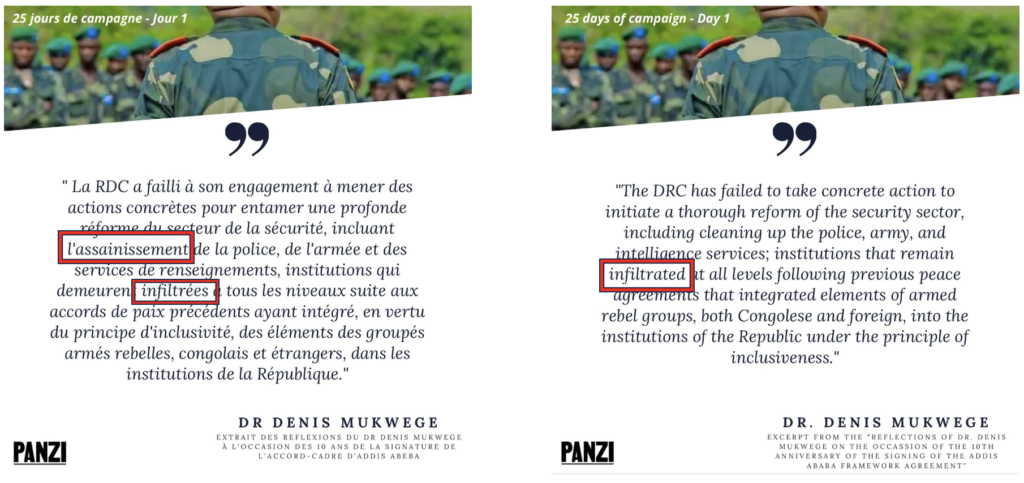
In the months leading up to the announcement of his candidacy for the DRC 2023 presidential election, Mukwege had officially hardened his tone, becoming more martial: “Stand up Congolese, Nation in danger!” reads one on his Twitter accounts. His public speeches in which he harangues the crowd also adopt the same tone. In comparison, it is impossible to find in his communications the slightest condemnation of the ongoing violence committed against the Congolese Tutsi. This is despite the revival of hate speech based on the ideology of “the Hamitic invader” which puts the targeted minority at risk, provoking repeated and documented assaults. Surfing on this anti-Tutsi, anti-Rwanda rhetoric, ensures Mukwege a solid and long-term popularity.
By way of conclusion, these actors who have an interest in gaining influence, are looking for a media niche, via the tragic situation in Congo, within Western circles of power. They feed from each other in two complementary ways; From the despair and deep resentment of Congolese citizens and their diaspora who do not know what to do or who to support so that their country could get its head above water; And from the Hamitic, anti-Tutsi ideology, which offers simplistic answers and outlets for this same resentment. As ideological work has been in place since colonization, it is enough to reactivate it from time to time, following the political trends of the moment, such as today for example, with the M23, a group accused of being an armed wing of Rwanda, while it is intrinsically Congolese.
The 1994 genocide against the Tutsi did not mark the end of ethnicist and racialist conflicts in the Great Lakes. On the contrary, they have since become commonplace and are used to mask a deep and destructive dispossession of Congolese citizens by their leaders. Denis Mukwege, Kemi Seba, and Maud Ekila twist facts to serve their personal and partisan interests. The only proven genocide in the region has become for them an artificial smokescreen, having allowed the “foreign Tutsi invader” to get his hands on the riches of the Congo. Although they are not the primary bearers or beneficiaries of this theory, they play a major role in anchoring it in the collective memory.
Mukwege’s productions, or those that revolve around his character such as the documentary The Empire of Silence, his book The Power of Women, his lectures, are all based on these principles: to anchor the idea that an insidious genocide is taking place in the Congo, that Rwanda is responsible for it, and therefore that an international tribunal must take on the task of tracing its contours and condemnations.
Colonel Bagosora, the mastermind of the 1994 genocide against the Tutsi in Rwanda, having imagined during his lifetime and during his time in the camps of the Congo a vademecum, a real remedy validating the theory of double genocide, in order to escape the International Criminal Tribunal, could not have dreamed of a better political legacy.
Thus, Denis Mukwege has become the respectable face of the actualization of the genocidal anti-Tutsi ideology, the real repercussions of which are now felt by Congolese minority groups assimilated to the Tutsi (Hema, Hima, Banyamulenge, or anyone with a “Tutsi facies” according to racist clichés).
Thank you for this clarification
This leaves me wondering on who actually a cess this information.
It should be distributed to all embassies and the known funders of this fake Nabel Price